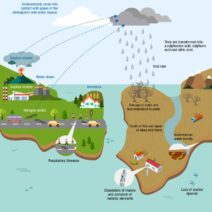Climate change poses an existential threat to our planet, necessitating immediate and concerted effort from all sectors of society. Communities are at the forefront of this battle against environmental degradation, armed with the potential to create profound impact through collaborative action. This article delves into the plethora of strategies communities can employ to combat climate change, focusing on education, advocacy, sustainable practices, and collective initiatives.
One of the quintessential avenues to effect change is education. Raising awareness about climate change is vital for galvanizing community action. Comprehensive educational programs can be implemented in schools, community centers, and local organizations, targeting individuals of all ages. Workshops, seminars, and discussion panels can elucidate the science behind climate change, emphasizing not just its causes but also the tangible effects on local ecosystems and human health. Furthermore, integrating climate education into existing curricula empowers youth to partake actively in environmental discourse. Such education fosters a generation that is not only informed but also emboldened to effect change through informed decision-making.
Advocacy is another pivotal aspect of community-level climate action. Local organizations can mobilize residents to advocate for policies that promote sustainable practices and renewable energy sources. By forming coalitions, communities can amplify their voices, making them more prominent in discussions with local governments and policymakers. Organizing petitions, attending town hall meetings, and lobbying elected officials to support climate-positive legislation can lead to meaningful change at the systemic level. Furthermore, campaigns aimed at promoting the importance of sustainability can inspire individuals to engage actively in local governance, ensuring that climate action remains a legislative priority.
Transitioning towards sustainable practices is imperative for communities aiming to mitigate their carbon footprint. One notable initiative is the promotion of local food systems. Encouraging residents to buy locally sourced produce not only supports local farmers but also reduces the carbon emissions associated with transporting food over long distances. Community gardens serve as an excellent embodiment of this practice, fostering collaboration among residents, and fostering biodiversity. These green spaces can also enhance food security and community resilience in the face of climate disturbances.
In addition, communities should prioritize the adoption of renewable energy sources. Organizing neighborhood initiatives to install solar panels or wind turbines can drastically reduce the reliance on fossil fuels. Such projects may require collaboration with local governments and renewable energy companies, but the long-term benefits far outweigh the initial investment. Community-owned energy cooperatives are particularly effective; they allow residents to pool resources and share the burden of the upfront costs while collectively benefiting from reduced energy bills and a cleaner environment.
Transportation is another area ripe for community-level intervention. By promoting carpooling, cycling, and the use of public transportation, communities can significantly reduce greenhouse gas emissions. Establishing bike lanes and safe walking paths encourages residents to adopt greener commuting methods. Additionally, organizing community-wide challenges—such as “car-free days”—can raise awareness about the benefits of reduced vehicle usage and promote a culture of sustainability. Such initiatives foster bonding among residents while addressing climate change collaboratively.
Waste management is another critical aspect where communities can take concerted action. Implementing robust recycling and composting programs can dramatically reduce the amount of waste that ends up in landfills, which in turn decreases methane emissions—a potent greenhouse gas. Conducting clean-up events in local parks or waterways can further instill a sense of stewardship among residents, emphasizing the importance of maintaining a clean and healthy environment. Education on waste reduction, involving concepts such as the “three Rs”—reduce, reuse, recycle—can help change consumer behavior and instill sustainable habits.
Moreover, fostering local advocacy groups focused on climate resilience can strengthen community bonds while addressing climate impacts. These groups can work on creating action plans that incorporate climate adaptation strategies tailored to the specific vulnerabilities of the community, such as flood risk management or urban heat island effects. By engaging community members in this process, residents feel a sense of ownership and responsibility toward the adaptations being proposed, making them more likely to support and sustain these initiatives.
It is equally important to embrace technological advancements in combating climate change. Communities can leverage technology to share knowledge and resources, creating platforms where residents can exchange ideas, tools, and techniques related to sustainable living. Engaging in digital forums can help disseminate best practices, motivating community members to adopt eco-friendly habits in their daily lives.
Finally, fostering collaboration with local businesses can amplify the impact of community initiatives. Encouraging enterprises to adopt sustainable practices, such as reducing energy consumption or sourcing materials locally, can create a collective ethos of sustainability. Businesses can also engage in corporate social responsibility initiatives to support community projects aimed at combating climate change. Encouraging partnerships between the public and private sectors can lead to innovative solutions that benefit both the economy and the environment.
In conclusion, combating climate change is a formidable challenge that requires actionable solutions at the community level. By prioritizing education, advocacy, and sustainable practices, communities can foster a culture of environmental stewardship that drives meaningful change. Collective action has the power to transform individual efforts into a robust movement capable of making a significant impact on our planet’s future. It is through unwavering commitment and collaboration, across diverse sectors of society, that we can hope to mitigate the effects of climate change and secure a sustainable legacy for generations to come.



